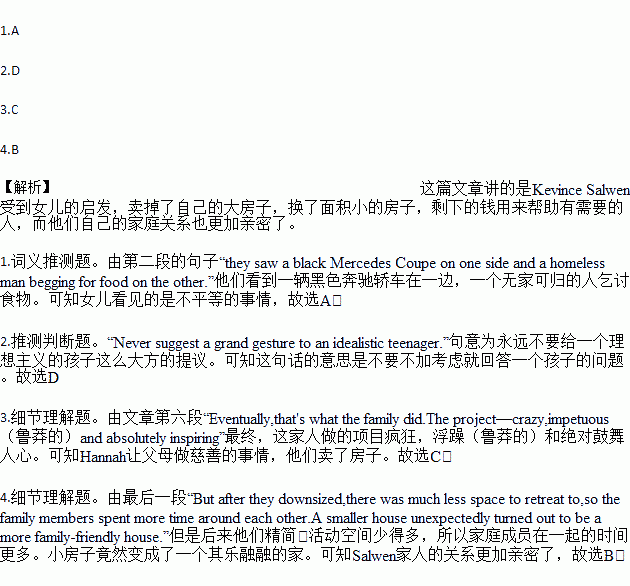题目内容
It all began with a stop at a red light.
Kevin Salwen was driving his 14-year-old daughter,Hannah,back from a sleepover in 2006.While waiting at a traffic light,they saw a black Mercedes Coupe on one side and a homeless man begging for food on the other.
"Dad,if that man had a less nice car,that man there could have a meal," Hannah protested.The light changed and they drove on,but Hannah was too young to be reasonable.She pestered(纠缠)her parents about inequity,insisting that she wanted to do something.
"What do you want to do?" her mom responded. "Sell our house?"
Warning!Never suggest a grand gesture to an idealistic teenager.Hannah seized upon the idea of selling the luxurious family home and donating half the proceeds(收入)to charity,while using the other half to buy a more modest replacement home.
Eventually,that's what the family did.The project—crazy,impetuous(鲁莽的)and absolutely inspiring—is written down in detail in a book by father and daughter scheduled to be published next month: The Power of Half.It's a book that,frankly,I'd be nervous about leaving around where my own teenage kids might find it.An impressionable child reads this,and the next thing you know your whole family is out on the street.
At a time of enormous needs in Haiti and elsewhere,when so many Americans are trying to help Haitians by sending everything from text messages to shoes,the Salwens offer an example of a family that came together to make a difference—for themselves as much as the people they were trying to help.In a column a week ago,it described neurological(神经生物学的)evidence from brain scans that unselfishness lights up parts of the brain normally associated with more primary satisfaction.The Salwens' experience confirms the selfish pleasures of selflessness.
Mr.Salwen and his wife,Joan,had always assumed that their kids would be better bigger house.But after they downsized,there was much less space to retreat to,so the family members spent more time around each other.A smaller house unexpectedly turned out to be a more family-friendly house.
1.What does the underlined word "inequity" most probably mean in Paragraph 3?
A. Unfairness. B. Satisfaction.
C. Personal attitude. D. Reasonable statement.
2.What is suggested in the underlined sentence "Never suggest a grand gesture to an idealistic teenager." in Paragraph 5?
A. Never give a quick answer to an idealistic teenager.
B. Unless a child is realistic,never give an answer immediately.
C. Give an answer if the child is reasonable.
D. Don't respond to a child's demands firmly without consideration.
3.Which of the following statements is IRUE according to the passage?
A. Mercedes Coupe is only an ordinary car which is quite cheap.
B. Unselfishness has nothing to do with people's primary satisfaction.
C. Hannah asked her parents to do charity and they sold their house.
D. The writer's children asked him to sell their house.
4.What can we learn from the last paragraph?
A. The Salwens regretted selling their house.
B. The family members get much closer.
C. Small houses can bring happiness.
D. The Salwens intend to buy another big house.

